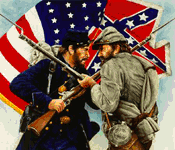 |
Civil War Battles |
|
State War Records |
| AL - AK - AZ - AR - CA - CO - CT - DE - FL - GA - HI - ID - IL - IN - IA - KS - KY - LA - MA - MD - ME - MI - MN - MS - MO - MT - NE - NV - NH - NJ - NM - NY - NC - ND - OH - OK - OR - PA - RI - SC - SD - TN - TX - UT - VT - VA - WA - WV - WI - WY |
The Battle of Shelton Laurel
January ??, 1863, North Carolina
 |
|||||||||||||||||||||
|
Throughout the war, western North Carolina, an area of bitterly divided loyalties, experienced a civil war of its own. On numerous occasions, the Unionists who predominated in that remote, mountainous region (many of them self-proclaimed bushwhackers) raided local Confederate outposts and supply depots. waylaid Confederate troops, and brutalized the families of leading seccessionists. Confederates in and out of uniform retaliated with equal violence, beating, torturing, and killing local "tories" and sacking their property.
The feud reached its height in January 1863, when a band of about 50 Union men, including several deserters from the 46th North Carolina Infantry, terrorized Confederate sympathizers living near Marshall, a village nestled in a secluded valley known as Shelton Laurel. the raiders- who sought booty, especially salt, a staple commodity in scarce winter supply that winter- plundered with such abandon that the local Confederate commander, Brig. Gen. Henry Heth, demanded that Shelton Laurel be cleared of guerrillas once and for all.
From his headquarters in East Tennessee, he assigned the task to the ranking officers of the deserters' regiment, Col. Lawrence M. Allen and Lt. Col. James A. Keith. Since Allen's home had been among the guerrillas' targets, he was not displeased when Heth stated: "I do not want to be troubled with any prisoners and the last one of them should be killed."
Quickly marching East, the 64th North Carolina swept through Shelton Laurel with a vengeance, sacking the homes on Unionists, beating and whipping their inhabitants (including women and children), and rounding up 15 male prisoners, aged 13 to 59. At least 2 captives escaped, a detachment under Keith massed the others near a mountain gorge early on January 18, then drew pistols and rifles. Ignoring the prisoners' pleas for mercy, the soldiers shot them down as they knelt in the road. 13 bodies were buried in a single shallow grave.
When the news leaked out, it rocked the Confederacy. Political officials including Sec. of War James A. Seddon and North Carolina Gov. Zebulon B. Vance demanded an investigation and the punishment of all found guilty. The army, however, impeded the inquery; the only tangible results were the forced resignation of Keith, who was jailed for a time after the war, and 4 of his officers. Col. Allen remained in the arny and Gen. Heth went east, where he won reown as a combat commander.
